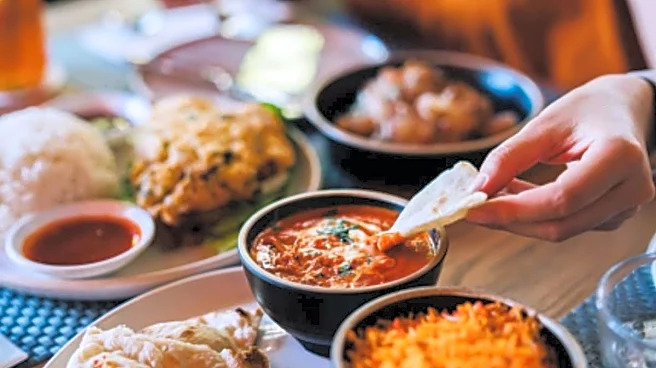You finish a delicious plate of biryani, or perhaps a hearty South Indian thali with rice, sambar, a couple of curries, papad, and a sweet dish. A few minutes later, your eyelids begin to droop, your body
feels heavy, and you find yourself fighting off sleep. It is not just you — this familiar post-meal fatigue is something millions of Indians experience every day.
But why does this happen? Is it unhealthy to feel drowsy after eating? Does it mean you are eating too much, or eating wrong? Let’s break down what happens to your body after a heavy meal, why the brain slows down, and what changes you can make for lighter, more energising meals.
What Happens To Your Body After A Heavy Meal
The feeling of sleepiness after a heavy meal is not a sign of weakness — it is your body’s natural reaction. Digestion is one of the most energy-intensive processes your body performs, and a large, calorie-dense meal demands a lot of resources.
When you eat, your stomach expands, triggering chemical and hormonal changes. Blood flow increases to your digestive system to help break down the food and absorb nutrients. That shift in blood flow can make other parts of your body, especially your brain, get slightly less oxygenated blood for a while, leaving you feeling sluggish and tired.
At the same time, your pancreas releases insulin to process the carbohydrates and sugars you have eaten. This insulin surge helps regulate blood sugar but also sets off a chain reaction that increases the production of tryptophan, an amino acid that later converts into serotonin and melatonin — two hormones that regulate relaxation and sleep.
So, in simple terms, a heavy meal signals your body to focus on digestion while hormonal changes gently push you towards rest. It is a double effect — physical (energy redirection) and chemical (sleep-inducing hormones).
Why It Is More Common In Indian Meals
If you have ever felt drowsy after lunch at an Indian household or after a festive dinner, you are not imagining it. Indian meals, though incredibly flavourful and diverse, are also among the heaviest and most carbohydrate-rich diets in the world.
A typical Indian plate includes:
- A large portion of rice or wheat-based rotis
- Several cooked vegetables or gravies
- Dal or lentil soup, which is protein-rich but also starchy
- Fried snacks or accompaniments like papad, pakoras, or puris
- Desserts made of sugar, jaggery, or milk solids
Such meals, while comforting, are a perfect recipe for post-meal fatigue. Here’s why:
- High Carbohydrate Load
White rice, wheat rotis, parathas, and sweets cause a sharp spike in blood sugar. To manage that, your body releases insulin, which, in turn, affects brain chemistry and promotes drowsiness.
- High Fat Content
Many Indian dishes are cooked in ghee, butter, or refined oils. Fat slows down digestion, meaning your body stays in digestion mode for hours, pulling energy away from your brain and muscles.
- Overeating By Custom
Culturally, Indian families encourage “eating well,” often meaning eating more than needed. Guests are served second and third helpings, and skipping dessert is almost considered rude. This habit leads to frequent overeating.
- Combination Of Multiple Dishes
Unlike minimalist diets elsewhere, Indian meals often combine rice, dal, curries, yogurt, and fried items in one sitting. While this gives variety, it also overloads the digestive system with fats, proteins, and carbs all at once.
- Timing Of Meals
Late-night dinners are common in urban India, especially after long workdays. Eating heavy food close to bedtime compounds the problem — digestion slows further, and the body’s circadian rhythm moves toward rest.
What Is The Science Behind Post-Meal Sleepiness?
- Insulin And ‘Food Coma’
When you eat a large, carbohydrate-heavy meal, your pancreas releases a surge of insulin to bring down blood sugar. Insulin helps cells absorb glucose, but also triggers the absorption of tryptophan — a compound that crosses into the brain and transforms into serotonin, and later melatonin, which makes you relaxed and sleepy.
- Blood Flow Redistribution
Your digestive organs demand more blood to power the breakdown of food. This diverts blood flow from your muscles and brain, causing temporary fatigue and slower reflexes.
- Inflammatory Response
Digesting a large meal, especially one high in refined carbs and saturated fats, releases inflammatory molecules known as cytokines. These signal the immune system to slow you down for digestion and recovery, leading to a sense of lethargy.
- Circadian Rhythm
Your body’s natural rhythm also dips slightly after lunchtime — a biological low point known as the “afternoon slump.” Combine that with a calorie-rich meal, and you get the perfect recipe for post-meal drowsiness.
When Is It A Problem?
Occasional post-meal fatigue is harmless — your body is simply doing its job. But when it happens every day, or feels extreme, it could indicate:
- Overeating or poor meal timing (especially late dinners)
- Insulin resistance or pre-diabetes, which intensifies energy crashes
- Food intolerances, such as sensitivity to gluten or lactose
- Nutrient deficiencies, particularly B vitamins or iron
- Sleep deprivation — poor rest amplifies the fatigue cycle
- Digestive disorders, such as acid reflux or sluggish metabolism
If you consistently feel drained after eating, even after moderate meals, it is a sign to rethink your diet composition and habits.
How To Prevent The Post-Meal Crash
The goal is not to stop eating well, but to eat smartly. Here is how to make your meals lighter, energising, and better suited for digestion:
- Watch Your Portions
Eating smaller meals more frequently prevents overload. Use smaller plates and stop eating when you feel 80% full — your stomach expands slowly, so give your body a chance to signal fullness.
- Balance Macronutrients
Each meal should have:
- Complex carbohydrates like brown rice, millets, or quinoa
- Lean proteins like lentils, paneer, tofu, or fish
- Healthy fats from nuts, seeds, or olive/mustard oil
- Fibre from vegetables and salads
- This mix stabilises blood sugar and provides lasting energy.
- Choose the Right Carbs
Swap polished white rice for brown rice, foxtail millet, or jowar. They release glucose slowly and keep you fuller longer without causing sugar spikes.
- Go Easy on Oil and Ghee
Use one teaspoon less each time you cook. Shallow-frying or steaming instead of deep-frying helps preserve nutrients and reduce fat load.
- Add Digestion-Boosting Spices
Traditional Indian spices like ginger, cumin, ajwain, fennel, turmeric, and black pepper stimulate enzymes that help digest heavy food faster.
- Don’t Skip Fibre
Vegetables, lentils, and salads keep your digestive tract moving smoothly. Include raw or lightly cooked vegetables with every meal.
- Stay Hydrated, But Wisely
Drink water 30 minutes before your meal, not immediately after — it dilutes stomach acids and slows digestion.
- Eat Mindfully
Avoid distractions while eating. When you chew properly and eat slowly, your stomach gets more time to signal fullness to the brain, reducing overeating.
- Take a Short Walk
A 10-minute gentle walk after eating helps stimulate digestion and regulates blood sugar levels, reducing drowsiness.
Lighter Indian Meal Ideas
For Breakfast
- Poha with vegetables and peanuts
- Idli or dosa with sambar and chutney
- Oats or ragi porridge with fruit
- Vegetable upma or dalia
For Lunch
- Brown rice with moong dal khichdi and curd
- Roti with dal, sabzi, and salad
- Quinoa or millet pulao with curd
- Tandoori chicken or grilled paneer with sautéed vegetables
For Dinner
- Moong dal soup with stir-fried vegetables
- Vegetable khichdi or barley stew
- Chapati with spinach dal or bottle gourd curry
- Grilled fish with brown rice and cucumber salad
Such meals are filling yet light on the stomach, rich in fibre and protein, and provide steady energy without causing post-meal fatigue.
Heavy Foods And Cause Sleepiness
If you struggle with drowsiness after eating, it’s best to limit or avoid:
- Deep-fried snacks like samosas, pakoras, and puris
- Cream-based gravies or butter-rich curries
- White rice and refined flour products
- Sugary sweets or desserts after meals
- Carbonated or sugary drinks
- Overly spicy food (can cause acidity and bloating)
When And How You Eat Matters Too
Even healthy food can cause discomfort if consumed at the wrong time or in the wrong way.
- Don’t eat very late at night — it disrupts digestion and sleep. Aim to finish dinner at least two hours before bed.
- Avoid lying down immediately after eating — it slows digestion and increases acidity.
- Keep meal timings consistent — irregular eating confuses your body’s hunger and energy rhythm.
- Take short breaks after meals — a brief walk or light movement prevents bloating and helps energy levels.
Why You Should Rethink Heavy Meals
In India, food is love — from festivals to family gatherings, our culture revolves around eating together and eating well. But modern life has made heavy, calorie-dense meals an everyday routine rather than an occasional indulgence.
The combination of large portions, low activity, and long sitting hours means digestion becomes sluggish. Over time, this habit does not just cause drowsiness — it can contribute to weight gain, insulin resistance, acidity, and poor sleep.
Shifting to lighter, balanced meals does not mean giving up your favourite dishes. It is about portion control, smart ingredient swaps, and meal timing. Even reducing oil slightly or replacing white rice with millets can make a significant difference to your energy and digestion.
Thus, heavy meals overwork your digestive system, trigger hormonal shifts, and slow blood flow to the brain, causing drowsiness.
By eating lighter, fibre-rich, balanced meals, staying hydrated, and avoiding overeating, you can feel satisfied and alert — not sluggish. A little mindfulness with your plate can go a long way towards improving not just digestion, but your overall health, focus, and well-being.


/images/ppid_59c68470-image-177087266276729031.webp)

/images/ppid_59c68470-image-177087262652841.webp)
/images/ppid_59c68470-image-177087259429213293.webp)
/images/ppid_59c68470-image-177087255900918262.webp)
/images/ppid_59c68470-image-177087252723963095.webp)
/images/ppid_59c68470-image-17708725466897211.webp)



/images/ppid_59c68470-image-17708725346551941.webp)